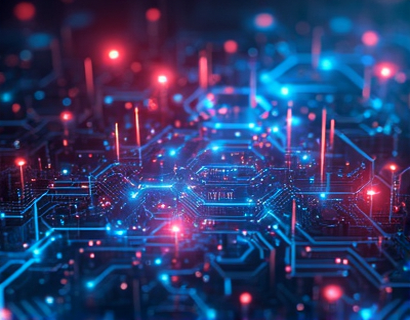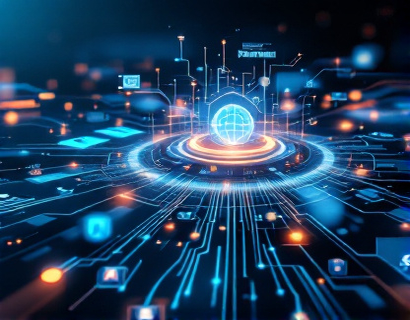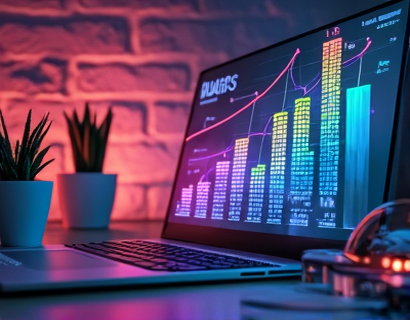Unlocking the Future of Productivity: The Synergy of AI and Cryptocurrency in Next-Gen App Solutions
The intersection of artificial intelligence (AI) and cryptocurrency is giving rise to a new era of productivity tools and applications. This fusion is not just a technological curiosity but a transformative force that is redefining how we approach daily tasks and workflows. For tech innovators and early adopters, the potential of AI and cryptocurrency combined is vast, offering unprecedented opportunities to enhance efficiency, security, and innovation. This article delves into the ways these technologies are merging to create next-generation app solutions that are set to revolutionize the digital landscape.
The foundation of this revolution lies in the unique properties of cryptocurrency and the capabilities of AI. Cryptocurrency, with its decentralized and secure nature, provides a robust framework for building applications that require high levels of trust and transparency. AI, on the other hand, brings intelligent automation and data-driven insights to the table. When these two technologies are combined, the result is a powerful toolset that can streamline complex processes and unlock new levels of productivity.
Enhanced Security and Trust
One of the most significant advantages of using cryptocurrency in app solutions is the enhanced security it offers. Cryptocurrencies like Bitcoin and Ethereum utilize blockchain technology, which ensures that transactions are immutable and transparent. This means that any app built on a blockchain can provide users with a high level of security, reducing the risk of fraud and data breaches. For businesses and individuals who handle sensitive information, this is a game-changer.
AI can further bolster this security by implementing advanced algorithms to detect and prevent malicious activities. Machine learning models can analyze patterns and identify anomalies in real-time, providing a proactive defense mechanism. This synergy ensures that apps not only store data securely but also monitor and protect it continuously. For tech innovators, this means building applications that users can trust, knowing that their data is safeguarded by the latest in security technology.
Intelligent Automation and Efficiency
AI-driven automation is another critical aspect of the AI and cryptocurrency convergence. Traditional workflows often involve manual steps that are time-consuming and prone to errors. By integrating AI into app solutions, these tasks can be automated, making processes faster and more accurate. For instance, smart contracts on the blockchain can be programmed to execute automatically when certain conditions are met, eliminating the need for intermediaries and reducing transaction times.
AI can take this a step further by optimizing these workflows based on real-time data. Machine learning algorithms can analyze vast amounts of data to identify inefficiencies and suggest improvements. This not only speeds up processes but also ensures that resources are used more effectively. For businesses, this means reduced operational costs and increased productivity, allowing them to focus on core activities that drive growth.
Personalized User Experiences
The combination of AI and cryptocurrency also enables the creation of highly personalized user experiences. AI can analyze user behavior and preferences to tailor applications to individual needs. This level of personalization is particularly valuable in apps that require user interaction, such as project management tools, financial planners, and educational platforms.
Cryptocurrency adds another layer of personalization through the use of digital identities and decentralized storage. Users can have control over their data and choose how it is shared and used. This not only enhances privacy but also allows for more customized and relevant app experiences. For example, a financial app can use AI to analyze a user's spending habits and offer personalized investment recommendations, all while ensuring that the data is securely stored on the blockchain.
Decentralized Applications (DApps)
Decentralized applications, or DApps, are a prime example of the AI and cryptocurrency synergy. DApps run on a blockchain network, which means they are not controlled by any single entity. This decentralization ensures that the app is resilient to censorship and downtime, providing a reliable service to users. AI can enhance DApps by adding intelligent features such as predictive analytics, natural language processing, and automated decision-making.
For instance, a decentralized finance (DeFi) platform can use AI to offer automated trading bots that make decisions based on market data and user preferences. These bots can operate 24/7 without the need for human intervention, providing users with continuous access to financial services. The transparency of the blockchain ensures that all transactions are visible and verifiable, building trust among users.
Tokenization and Incentivization
Tokenization, a concept deeply rooted in cryptocurrency, can be used to incentivize user engagement and participation in app ecosystems. By issuing tokens that represent value within the app, developers can create a system where users are rewarded for contributing to the platform. These tokens can be used for various purposes, such as accessing premium features, voting on protocol changes, or earning rewards for completing tasks.
AI can optimize tokenization by analyzing user behavior to determine the most effective incentive structures. Machine learning models can predict which types of rewards will motivate users the most, ensuring that the token economy is sustainable and beneficial for all participants. This approach not only enhances user engagement but also fosters a community-driven development process, where users have a stake in the app's success.
Data Privacy and Ownership
Data privacy is a growing concern in the digital age, and the combination of AI and cryptocurrency offers solutions to protect user data. Blockchain technology ensures that data is stored in a decentralized manner, reducing the risk of centralized data breaches. AI can further enhance data privacy by implementing advanced encryption techniques and zero-knowledge proofs, which allow for data verification without revealing sensitive information.
Users can have greater control over their data, deciding who can access it and for what purpose. This level of control is empowering and aligns with the growing demand for privacy-focused applications. AI can help manage and secure these data rights, ensuring that user preferences are respected and enforced. For tech innovators, this means building apps that not only comply with data protection regulations but also exceed user expectations in terms of privacy.
Future Trends and Innovations
The future of AI and cryptocurrency in app solutions is exciting and full of potential. One emerging trend is the integration of AI-powered virtual assistants that operate on blockchain networks. These assistants can provide users with personalized guidance, automate routine tasks, and offer real-time insights, all while maintaining a high level of security and privacy.
Another area of innovation is the development of AI-driven marketplaces for decentralized services. These platforms can connect service providers and consumers directly, eliminating intermediaries and reducing costs. AI can optimize matching algorithms to ensure that users find the most suitable services based on their needs and preferences. This not only enhances the user experience but also promotes a more efficient and fair economy.
Additionally, the convergence of AI and cryptocurrency is paving the way for new forms of digital identity and authentication. Self-sovereign identity systems, powered by blockchain and AI, can give users full control over their digital identities, allowing them to verify their identity seamlessly across different platforms and services. This reduces friction and enhances the overall user experience.
Conclusion
The fusion of AI and cryptocurrency is driving the next wave of productivity tools and applications, offering tech innovators and early adopters a wealth of opportunities. By leveraging the security, efficiency, and personalization capabilities of these technologies, developers can create apps that not only streamline daily tasks but also empower users in unprecedented ways. As the digital landscape continues to evolve, the synergy between AI and cryptocurrency will remain a key factor in shaping the future of productivity and innovation.











































